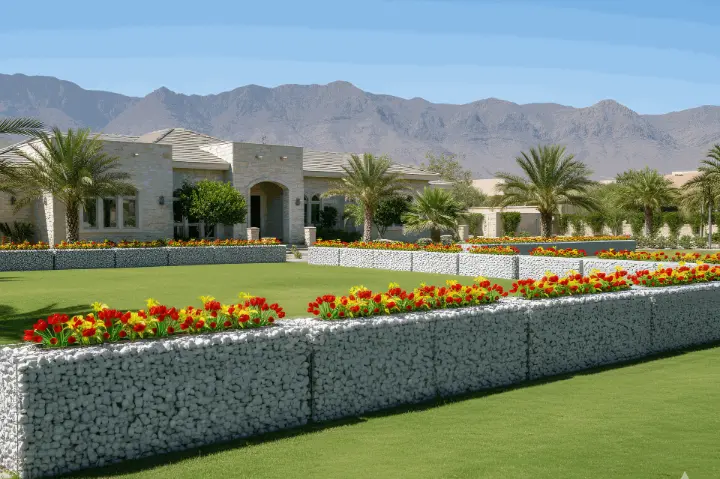Gabions are now normal and required in construction, landscaping and in erosion control in the current society, particularly in the context of dealing with some of the most extreme environments and extreme locations. The underlying structure of the gabion is of gabion mesh; the mesh is used to hold the stones or rock in place and gives it structural strength and structural integrity.

The mesh type is also a consideration since it bears on the lifespan of the gabion, how they will withstand the environment in the area where they will be installed and whether they will perform the project as expected.
Welded Gabion Mesh
Welded gabion mesh consists of a series of steel wires welded at every intersection into a rigid flat panel. These are then connected to make the gabion basket.
Characteristics
- Offers a modern decorative profile.
- Has a high load bearing capacity due to the rigid structure.
- It is easier and faster to assemble than woven types
Uses
- Decorative walls in gardens, villas.
- Recreational landscaping in resorts and urban areas.
- Retaining walls in residential or lightweight commercial situations.
Woven Hexagonal Gabion Mesh
This is one of the most common and traditional types. It features a hexagonal double-twisted wire design that allows flexibility and durability despite a break in one section of the wire.
Features
- Highly flexible, accommodates movement of the ground underneath without breaking.
- Increased resistance to load based pressure from heavy stone in the mesh.
- Inexpensive and easily available.
Applications
- Protection of riverbanks and edges.
- Control of slope and embankment erosion.
- Large retaining walls on road and highway projects.
PVC-Coated Gabion Mesh
PVC-coated mesh is essentially a steel wire with a plastic exterior. This offers increased resistance to oxidation and weather conditions.
Features
- Great resistance to moisture, salt, and chemicals
- A longer lifespan than regular galvanized mesh.
- Can be used under extreme conditions such as coastal regions and deserts.
Applications
- Seawalls for coastlines for saltwater corrosion resistance.
- Harsh environments that receive heavy rainfall or are humid.
- Infrastructure that requires a longer lifespan.
Galfan Gabion Mesh
Galfan mesh is composed of steel wires coated with an alloy of zinc and aluminum, resulting in a higher level of corrosion resistance than normal galvanized wire.
Features
- Greater resistance to corrosion than pure zinc-coated mesh.
- Long lasting even in aggressive environments.
- Maintains flexibility and strength.
Applications
- Applications in bridges, dams and major infrastructure works.
- Coastal and marine applications.
- Steels and projects requiring a 50+ years lifespan.
Stainless Steel Gabion Mesh
While not as commonly used due to cost, stainless steel gabion mesh is unrivaled in durability and resistance.
Features
- Strength and weather resistance unparalleled in gabion mesh.
- Corrosion-proof and maintenance-free.
- Longevity, often greater than 100 years.
Applications
- Architectural and decorative projects when the aesthetic is a factor.
- High-end resorts, hotels and commercial landscaping.
- Specialty projects in corrosive environments.
Selecting the Appropriate Gabion Mesh
When determining a gabion mesh, you will want to keep the following in mind:
Environment: Near the coast or in wetlands, you should choose PVC-coated or Galfan mesh. If the project is inland or in a dry environment, both galvanized, or welded wire mesh should be appropriate.
Budget: Welded wire and galvanized wire will be more affordable, whereas Galfan and stainless steel will be more expensive, but will last longer.
Function: For decorative projects, welded wire mesh will look the cleanest. The woven hexagonal mesh is more appropriate for erosion control or flood protection, as it is flexible.
Benefits of Investing in Gabion Mesh
- Durability: Quality mesh will allow the gabions to last 50–100 years.
- Flexibility: Hexagonal mesh can morph to any soil movement so it does not collapse.
- Cost Savings: Gabions are cheaper than using concrete and are easy to maintain.
- Sustainable: Mesh allows for natural drainage and vegetation.
- Aesthetic Values: Variety mesh will lend to beautiful designs and the aesthetic application.
Comparison Table: Types of Gabion Mesh
| Type of Gabion Mesh | Key Features | Best Applications |
|---|---|---|
| Welded Mesh | Rigid, neat look, easy to install, high load capacity | Decorative walls, villas, landscaping, light walls |
| Woven Hexagonal Mesh | Flexible, economical, adjusts to soil movement | Riverbanks, erosion control, slopes, highways |
| PVC-Coated Mesh | Corrosion-resistant, weather-proof, durable | Coastal seawalls, flood zones, infrastructure |
| Galfan Mesh | Zinc-aluminum coating, long life, strong resistance | Dams, bridges, marine and coastal projects |
| Stainless Steel Mesh | Premium strength, corrosion-proof, aesthetic appeal | Resorts, hotels, decorative landscaping |
Final thoughts
The gabion wire cloth provides the basis of a robust and durable gabion; while also looking quite visually pleasing. There are different types of gabion wire cloth available; welded wire for aesthetic contemporary landscaping projects, woven hexagonal wire for erosion applications, and PVC-coated gabions for coastal structures; as each type of gabion wire has its own individual selling points.
Lastly, it is important to consider that gabions are not simply stone-filled cages. They are sustainable, cost-effective, flexible futures in construction and landscape architecture.
Gabion Mesh FAQs
Galfan-coated and stainless steel gabion meshes are the most durable, lasting 70 years to more than 100 years depending on conditions.
Welded wire gabions provide a modern, neat appearance, while woven hexagonal wire gabions are more flexible and effective for erosion control.
Yes. Gabion mesh respects nature by allowing natural water drainage, supporting vegetation growth, and reducing carbon footprint when filled with local stones.
Yes. When coated with PVC or made of Galfan, gabion mesh is resistant to saltwater corrosion and suitable for coastal applications.
Stones sized 100–200 mm (about 1.5–2× the mesh opening) provide the best stability and prevent leakage through the mesh.